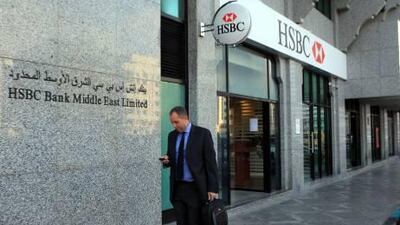HSBC's earnings from emerging markets dwindled as the world's fastest-growing economies cooled, although the Middle East bucked the trend to join Europe and the United States in generating higher earnings.
HSBC Holdings, Europe's biggest bank by market capitalisation, reported net profits for the first half of US$10.2 billion, an increase of 21.8 per cent compared with the same period last year, in line with analysts' estimates.
HSBC Middle East, its regional subsidiary, reported profits before tax of $909 million for the first half of the year, an increase of 6.5 per cent during the same period.
"There has been a slowdown in faster-growing markets in recent quarters. But even emerging markets go through business cycles," said Stuart Gulliver, the bank's chief executive.
But the bank's shares fell immediately after the announcement as the bank missed revenue estimates.
HSBC's London-listed shares were down as much as 5.8 per cent to 710.40 British pence per share during trading.
"For all the worthy progress in terms of strategic repositioning... weak revenues driven by anaemic loan growth and a declining margin constrain financial progress and returns," Ian Gordon, an analyst at Investec, told Reuters.
In the Middle East, the UAE was the fastest-growing of the bank's markets, with pre-tax profits up 12 per cent to $338 million during the first half.
"In the Middle East and North Africa, we benefited from net releases of impairment charges, reflecting the improvement in the financial position of certain customers," the bank said.
But lending to the region was flat at $27.9bn during the same period.
The UAE's banking sector has reported rapid growth of loan books during the period, with lenders increasing credit at the fastest rates in several years.
For some banks, such as Mashreq and Emirates NBD, the second quarter was the strongest for new lending since 2008.
"While Saudi Arabia, Qatar and Oman remained the region's best performers, the United Arab Emirates' economy substantially improved in the first half of 2013, as Dubai in particular benefited from strong external demand and its safe haven status amid continued political turmoil elsewhere in the region," HSBC said in a statement.
"Fiscal policy in the UAE also turned more expansionary in the period, as did credit conditions."
However, HSBC's income from Egypt fell to $117m during the period, a 4 per cent decline compared with the same period last year.
"Outside the GCC growth was much weaker, particularly in Egypt, where political unrest restricted economic activity, widened the budget deficit and put severe pressure on the currency," the bank added.
"The outlook for Egypt remains highly uncertain."
On Sunday, the bank confirmed it had told dozens of diplomatic missions in London that it would close their accounts as part of a reassessment of its business.
Rival emerging markets lender Standard Chartered, the second-biggest international bank in the UAE, is due to report earnings today.
Also reporting earnings yesterday was Ajman Bank, a tiny Islamic lender established in 2008, which reported an 86 per cent drop in net profits to Dh960,000.
The bank reported a 57.6 per cent leap in charges for bad debts to Dh12.5m.

